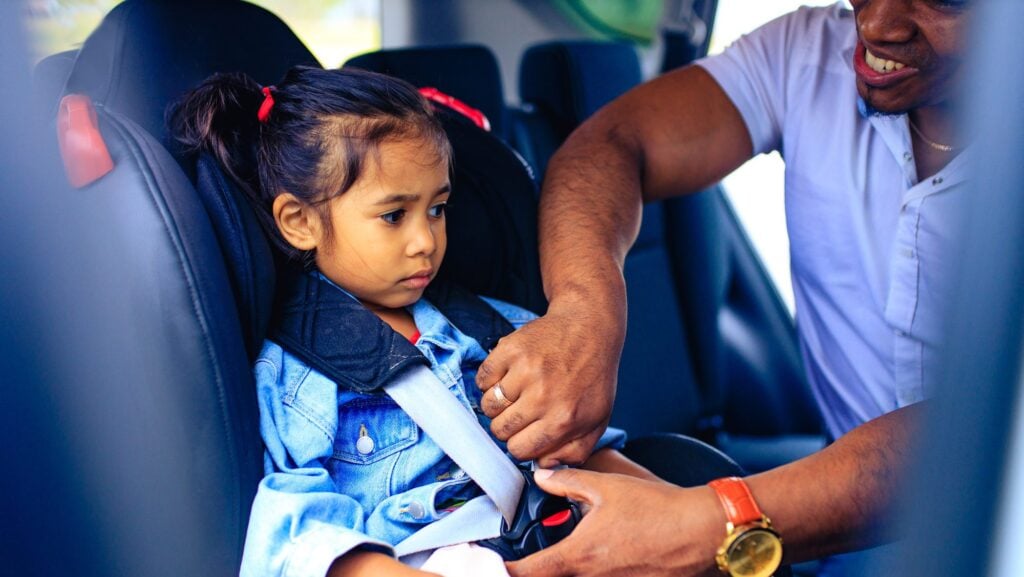Renting a car that’s big enough to hold everyone in your family can be expensive on its own, never mind the added risks you assume in actually driving the rental car on a road trip. Fortunately, you can minimize both your costs and the risks of your family car rental with just a little forethought.
The biggest possible issues for family rental cars are the same issues that can trip up just about any kind of traveler—buying travel insurance you don’t need, getting gouged on gas prices, overpaying at airport locations—but there are a few rental car problems that hit families especially hard.
COMPARE AND SAVE: 10 Best Car Rental Booking Sites for Cheap Prices
Common Family Car Rental Issues
Whether you’re traveling as a family with kids, as a solo vacationer, or as a business traveler, if you’re renting a car, you’ll likely face a few additional issues common to everyone looking to get a good deal. And beyond the problems that all renters face, families face two additional and very specific challenges when renting cars. Here’s a rundown of what to expect, and how to navigate each car rental issue.
1. Renting a Car That’s Too Small

The biggest mistake most families make is attempting to get the lowest prices by renting a car that’s too small. Whether you’re using a rental car to take a full on family road trip or are just using it to get around in your destination, chances are you’re going to spend many hours in that rental car.
SNEAKY FEES: How to Avoid Hidden Car Rental Fees
The back seats in today’s compact cars are almost always too tight for teenagers, adults, (and seniors, which is important if you’re planning a multi-generational trip that includes grandparents or other older relatives). Even younger kids in car seats or boosters might also be a tight squeeze alongside luggage and other travel essentials.
And it’s not just people you’ll need to fit into a rental car, it’s also luggage and other items you might acquire along the way. Doing the vacation math, when you’re renting a car for your family, you’ll probably need at least an intermediate-sized and more likely a full size vehicle. Most rental companies now offer a wide choice of SUV options or passenger vans with adequate back-seat accommodation for child seats and day packs, which is an even better solution for family car rentals. When in doubt, always choose the larger vehicle.
The caveat here is, of course, if you’re driving in a place (like Europe), where streets and parking spots are built for smaller cars, you’ll want to balance out your space needs with a vehicle size that works with your surroundings.
2. Paying Extra to Add a Second Driver
Typical car rental agreements these days allow only the person named on the contract to drive the car. If, as is natural for a family, you want to share driving chores among two or more adults, each likely driver must be listed on the contract.
TRAVEL WITH TEENAGERS: 10 Best Vacation Ideas for Families with Teens
Those agreements often call for an extra-driver fee of $5 (or more) per day. But there’s an easy way to avoid this little gouge on family car rentals. Membership with AAA, AARP, or your car rental company’s frequent-renter loyalty program (generally free to join even if you’re not a frequent renter) will often allow you to get the added driver fee waived.
3. The Rental Car Insurance Scam
Car rental insurance has always been the number one minefield when renting a car, and it’s an area where I have some strong opinions. Because when it comes down to it, you definitely need car insurance, but you usually don’t need the expensive options the rental company tries to push on you.
SPEND WISELY: Which Optional Car Rental Fees Should You Pay?
Liability for an accident caused by your driving is the biggest-dollar risk when renting a car. It covers the cost of damages or injuries you might inflict on someone else or their property. This isn’t just a rental issue: You should never get behind the wheel of any car—or even get out of bed—without adequate liability insurance.
The liability insurance included with your rental car is absurdly inadequate, so you need better coverage. Your own auto or homeowner insurance policy probably covers you, and you should also have a maximum umbrella policy—even if you never rent a car. In the unlikely event you don’t already have adequate coverage somehow, you will have to pay for the rental company’s overpriced option. But if you already carry liability insurance, you should not have to pay twice to get the car rental company’s insurance on top of your own.
BEST TRIP EVER: 50 Best Family Vacation Ideas for All Ages
Then there’s the collision insurance question. Collision insurance covers damage to, or loss of, the car you rent. Obviously, when you’re using someone else’s car, you’re liable for the costs if it is damaged when in your control. The rental company will try to sell you a collision damage waiver (CDW) that eliminates your risk but roughly doubles the daily cost of the rental. Instead, you can rely on either your own automobile insurance, which may cover you in a rented car; or your credit card, which may cover what your regular insurance doesn’t.
But either of those options means a big hit on your personal policy, which may increase your rates. To avoid that, you can buy rental-car collision coverage from a third-party source for about one-third of what the rental company asks. Most car rental booking sites offer this option when you rent through them, as do specialist agencies such as Bonzah.
4. Overpaying for Gas

The best way to avoid being overcharged for gas is to start your rental with a full tank and return it full. Sometimes, when you’re returning a car at a departure airport, finding a convenient gas station can be a problem, but if you don’t return it full, you can expect a refueling gouge. When you refuel, get a receipt; you may have to show it.
FAMILY VACATIONS: 10 Best Places to Go with Kids This Year
You can usually “buy” a full tank when you start, but you donate whatever is left in the tank to the rental company. Also, some rental companies charge a flat rate for short-term rentals where you drive only a few miles—a rate that’s substantially more than what you’d pay for the gas you used. Because these fees tend to be gauges, the best thing to do is really to refuel just before returning the car.
5. Airport and Rail Location Fees
Renting at some airports (and, in Europe, rail stations) can add hefty “premium station” fees. If you’re seeing airport fees spiking the cost of your rental when you’re searching, you might consider avoiding them by renting from an off-airport or downtown rental car location. But if you’re flying in somewhere, that means added hassle of getting to the alternative rental office.
It’s your call, but especially if you’re vacationing with toddlers, this might be one fee you’re better off absorbing into the cost of your vacation. Paying a cheaper price in exchange for extra time and added hassle is almost never the best option when considering family car rentals.
FAMILY CAMPING: 10 Best Campgrounds and RV Parks for Families
You can also encounter a couple of minor problems: limits on where you can drive and per-mile charges. Smaller companies, in particular, may impose these limits, but you can almost always find a rental company that doesn’t, especially if you’re renting with one of the major car rental companies.
More from FamilyVacationist:
- 10 Best Hotel Booking Sites for Cheap Prices
- 10 Unforgettable RV Road Trips in the U.S. for Families
- 37 Best Kids Jokes for Home, School, and Travel













